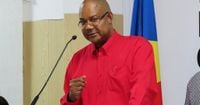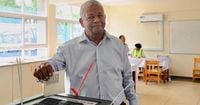In a historic shift for the Indian Ocean nation of Seychelles, opposition leader Patrick Herminie has emerged victorious in the presidential run-off election held on October 12, 2025, defeating incumbent President Wavel Ramkalawan. According to official results released by the Seychelles electoral commission, Herminie secured 52.7% of the vote, while Ramkalawan garnered 47.3%, marking the end of a closely contested race that was dominated by pressing environmental and economic issues.
Herminie’s win signals a dramatic return to power for the United Seychelles party, which had previously governed the country for over four decades, from 1977 until its defeat in 2020. The party’s resurgence has been further cemented by its victory in last month’s parliamentary elections, where it claimed 15 of 26 seats, giving it a clear legislative majority and full control of the government.
“The people have spoken,” Herminie declared at the headquarters of the electoral commission after being pronounced president-elect, as reported by the Associated Press. “I am deeply humbled by the trust the people have placed in me, and I formally accept this mandate with gratitude, a profound sense of duty and an unshakeable faith in the strength and character of the Seychellois people.”
At 62 years old, Herminie is no stranger to political life in Seychelles, having served as the speaker of the National Assembly from 2007 to 2016. His campaign focused on lowering the cost of living, reviving public services, and uniting the island nation, which has become Africa’s wealthiest country per capita, boasting around $18,000 according to the World Bank. However, beneath the surface of prosperity, Seychelles faces significant challenges, including its vulnerability to climate change and a severe heroin addiction crisis that has plagued its population of around 120,000.
In his victory speech, Herminie pledged, “I will be the president of all Seychellois, and I will end divisions by ceasing preferences and giving everyone the opportunity to thrive.” He also promised to lower the retirement age from 65 to 63 and to implement recommendations from a truth and reconciliation commission that examined human rights abuses stemming from the 1977 coup and its aftermath, according to Al Jazeera.
The path to Herminie’s victory was anything but straightforward. The first round of voting, held in late September 2025, failed to produce an outright winner, as neither Herminie nor Ramkalawan secured the necessary majority of more than 50%. This led to a run-off election, with early voting beginning on October 9 and most ballots cast on October 11. The spirited campaigns of both candidates centered on issues that resonate deeply with Seychellois voters: environmental protection, economic recovery, and the fight against drug addiction.
Ramkalawan, representing the Linyon Demokratik Seselwa party, had sought a second term, campaigning on his record of economic recovery from the COVID-19 pandemic and the expansion of social protections. However, growing opposition to his government became apparent in the months leading up to the election. A week before the first round of voting, activists filed a lawsuit against the government, challenging its decision to grant a long-term lease for a 100-acre area on Assomption Island to a Qatari company for luxury hotel development. The deal, which included plans to reconstruct an airstrip for international flights, sparked widespread criticism and environmental concerns. Many feared the project would prioritize foreign interests over the welfare and sovereignty of Seychelles and threaten a UNESCO-listed coral atoll.
Herminie seized on these concerns, promising to cancel the controversial hotel project if elected. He also accused Ramkalawan’s administration of presiding over a proliferation of corruption, vowing to restore integrity to public life. Environmental damage and the nation’s heroin addiction crisis were central themes throughout the campaign. Seychelles, often lauded as a tourist paradise, has become a major drug transit route between Africa and Asia. The United Nations and the 2023 Global Organized Crime Index have highlighted the country’s struggle with heroin addiction, with estimates of 5,000 to 10,000 users—an astonishing figure for such a small population.
Herminie’s background as a physician and his previous role as head of the government’s anti-drug agency lent credibility to his promises to tackle the addiction crisis head-on. “We must address the roots of this epidemic, not just its symptoms,” he said during his campaign, emphasizing a holistic approach that includes prevention, rehabilitation, and international cooperation.
Despite the fierce competition, the transition of power unfolded with a sense of civility and mutual respect. Ramkalawan publicly acknowledged his defeat, congratulating Herminie and expressing hope for the country’s continued progress. “I leave with a legacy that makes many presidents blush… I hope President Herminie continues to maintain such a level,” Ramkalawan remarked, as reported by Seychelles Nation. Images of the two leaders shaking hands after the announcement underscored the peaceful nature of the electoral process—a point of pride for the archipelago nation.
Herminie’s victory also marks a personal turnaround. In 2023, he was arrested on charges of witchcraft, which were later dropped, an episode that briefly threatened his political career but did not diminish his standing with the electorate. Now, as Seychelles’ sixth president, Herminie faces the daunting task of delivering on his promises in a country where economic prosperity is juxtaposed with deep-seated social and environmental challenges.
Located across 1.2 million square kilometers in the western Indian Ocean, Seychelles is made up of 115 islands and is renowned for its luxury tourism industry, pristine beaches, and unique biodiversity. The nation’s strategic position has also made it a target for investment and security cooperation with China, Gulf nations, and India. Yet, its small size and geographic isolation have left it particularly exposed to the effects of climate change, such as rising sea levels and coastal erosion—an existential threat that Herminie has pledged to confront through both local action and international advocacy.
As thousands of supporters celebrated outside the electoral commission headquarters, waving flags and party banners, Herminie’s ascent to the presidency was met with a palpable sense of hope and anticipation. The challenges ahead are formidable, but for many Seychellois, the election represents a fresh opportunity to address the nation’s most pressing problems and chart a more inclusive, sustainable future.
With a new president at the helm and a parliamentary majority in hand, Seychelles now stands at a crossroads—its next chapter to be written by a leader who has promised unity, reform, and a renewed commitment to the well-being of all its citizens.


